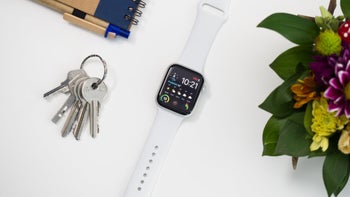Study confirms that the Apple Watch saves lives

A large study sponsored by Apple has revealed that the Apple Watch can detect an irregular heartbeat. 400,000 Apple Watch users were invited to take part in the study and the results were presented today in New Orleans at a meeting of the American College of Cardiology. 2,000 participants, or .5% of those wearing the smartwatch, received a notification about an irregular pulse. The 2,000 were sent a patch for their Apple Watch that included an electrocardiogram (ECG) sensor to help detect atrial fibrillation (AFib).
AFib, which is an irregular heartbeat, can lead to strokes, blood clots, heart failure and other serious issues. AFib contributes to 130,000 deaths a year in the U.S. The Apple Watch series 4 already includes an ECG monitor right out of the box, but the study was completed before this new variant of the timepiece was released. Returning to the study, about 33% of the 2,000 study participants who were flagged with an irregular pulse were told that they had AFib, according to the ECG patch that they were sent.
57% of the Apple Watch wearers in the study sought medical help when they received a warning about an irregular pulse. That number might surprise consumers since it means that 43% of Apple Watch wearers in the study ignored the warning. Dr. Mitesh Patel, an assistant professor of medicine at the Perelman School of Medicine, noted that while the Apple Watch is good at detecting warning signs of heart disease, the watch needs to be combined with something that will motivate users to act on these warnings. In other words, receiving a warning without following up on it could prove fatal to the user.
When an Apple Watch wearer in the study received a notification of an irregular heartbeat, the notification would ask the participant to schedule a telemedicine appointment with one of the doctors associated with the study. At that point, the ECG patch would be sent to those receiving the notification, and was used to record the rhythm of their heart for up to one week.
Only 57% of study participants receiving an irregular pulse notification sought medical help
The researchers behind the study said that Doctors need to be careful when using data from consumer devices when treating patients. On the other hand, a Boston cardiologist named Dr. Deepak Bhatt said that the study was very important because more people will be wearing wearable devices in the future.
"Atrial fibrillation is just the beginning, as this study opens the door to further research into wearable technologies and how they might be used to prevent disease before it strikes."-Lloyd Minor, dean, Stanford School of Medicine
"The performance and accuracy we observed in this study provides important information as we seek to understand the potential impact of wearable technology on the health system."- Dr. Marco Perez, co-principal investigator and associate professor of cardiovascular medicine, Stanford Medicine
Apple plans on making a big push into healthcare, and the Apple Watch is at the vanguard of this decision. While the series 4 model includes an ECG monitor along with the heart rate monitor that all Apple Watch models have, the company is working on a way for the Apple Watch to show a user's blood glucose reading without a needle stick. This reading is used by diabetics to determine how much insulin they need to inject to bring their blood sugars down to a normal level. Currently, diabetics need to draw blood and place a drop of it on a test strip inserted into a glucometer to get a reading. This test is done several times a day. If Apple succeeds in producing a non-invasive blood glucose test for the Apple Watch, this alone could help Apple stay on top of the smartwatch market.













Things that are NOT allowed: